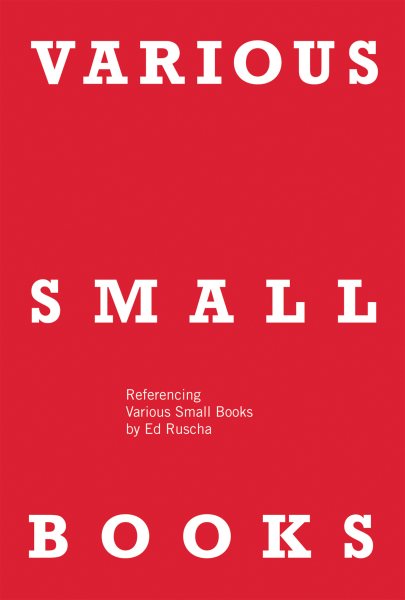Art and Architecture
Art Books: Various Small Books: Referencing Various Small Books By Ed Ruscha

“In plain sight, but overlooked, the gas station excites interest in Ruscha” (p. 21), but also serves as a document of the everyday world that co-exists with our routine and triggers our nostalgia as we see it change over time.
Various Small Books: Referencing Various Small Books By Ed Ruscha collects works in homage to Ed Ruscha’s series of artists books from the 1960s and 1970s of mundane photographs on like subjects. Ruscha made books using common things like parking lots, gas stations and small fires as subjects. This sparked a practice among artists, who in the decades since, have imitated and attempted to flatter Ruscha with their own small repetitive books. Author Phil Taylor has thanked them (with the help of some collaborators) by collecting them and writing about a few for our enjoyment and scrutiny. Various Small Books gives examples of works, grouped by time frame, with a short essay describing each book. It also includes a catalog at the end of every known small book tribute to Ruscha (as of May 2012). For example, a book called Twentynine Palms (1991) by Jeff Brouws, which photographs palm readers signs, nods at Ruscha’s A Few Palm Trees, which is actually of palm trees in Los Angeles. Jonathan Monks' None of the Buildings on Sunset Strip (1997-99) documents the intersections of Sunset Strip, the places between the buildings documented in Ruscha’s Every Building on the Sunset Strip.
Ruscha began making his small books in 1962 as a comment on his traveling from Oklahoma to California and the necessity of the gas station to the traveler, and its acceptance in the landscape, “like trees” (p.21). Many of his small books are often a comment on the landscape of Southern California. (James Kessinedes writes an interesting essay on this changing landscape of California). Ruscha photographs signposts, swimming pools and the Sunset Strip and binds them together in equatorial importance in small books, only to also emphasize the ubiquity and commonness. The mundane of it could be anywhere, but somehow they all have a quintesential Californianess in spite of themselves. Ruscha himself has said, “I am interested in what is interesting.” And, he made an influential art form that proved he was right. Check out these other titles:
Some small books available at NYPL:
Burning Small Fires by Bruce Nauman - Nauman burning Ruscha’s books.
Learning from Las Vegas: the Forgotten Symbolism of Architectural Form by Robert Venturi - using the view from the car on the highway to organize urban strip mall architectural theories.
House Pictures by Henry Wessel - California houses inspired by Wessel’s mother’s real estate office.
A Year of Mornings: 3191 Miles Apart by Maria Alexandra Vettese and Stephanie Congdon Barnes - a look at what the artists had for breakfast and lovely table settings that are kind of like your everyday mornings but calmer.
Books (small and otherwise) by and about the artist Ed Ruscha:
Every Building on the Sunset Strip
Ed Ruscha and Some Los Angeles Apartments by Virginia Heckert
Ed Ruscha and Photography by Sylvia Wolf
Ed Ruscha by Richard Marshall
A few places in NYC to visit to read, learn about, make, or buy artists books:
The Miriam and Ira D. Wallach Division of Art, Prints and Photographs in the Stephen A. Schwarzman Building
Brooklyn Museum Libraries and Archives
New York Art Book Fair at PS1 (September 26-28, 2014)
Read E-Books with SimplyE
 With your library card, it's easier than ever to choose from more than 300,000 e-books on SimplyE, The New York Public Library's free e-reader app. Gain access to digital resources for all ages, including e-books, audiobooks, databases, and more.
With your library card, it's easier than ever to choose from more than 300,000 e-books on SimplyE, The New York Public Library's free e-reader app. Gain access to digital resources for all ages, including e-books, audiobooks, databases, and more.
If you don’t have an NYPL library card, New York State residents can apply for a digital card online or through SimplyE (available on the App Store or Google Play).
Need more help? Read our guide to using SimplyE.